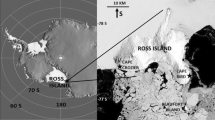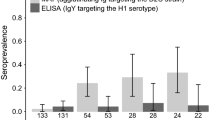Abstract
West Nile virus (WNV) infection can be fatal to many bird species, including numerous raptors, though population- and ecosystem-level impacts following introduction of the virus to North America have been difficult to document. Raptors occupy a diverse array of habitats worldwide and are important to ecosystems for their role as opportunistic predators. We documented initial (primary) WNV infection and then regularly measured WNV-specific neutralizing antibody titers in 16 resident raptors of seven species, plus one turkey vulture. Most individuals were initially infected and seroconverted between July and September of 2003, though three birds remained seronegative until summer 2006. Many of these birds became clinically ill upon primary infection, with clinical signs ranging from loss of appetite to moderate neurological disease. Naturally induced WNV neutralizing antibody titers remained essentially unchanged in some birds, while eight individuals experienced secondary rises in titer presumably due to additional exposures at 1, 2, or 3 years following primary infection. No birds experienced clinical signs surrounding or following the time of secondary exposure, and therefore antibodies were considered protective. Results of this study have implications for transmission dynamics of WNV and health of raptor populations, as well as the interpretation of serologic data from free-ranging and captive birds. Antibodies in raptors surviving WNV may persist for multiple years and protect against potential adverse effects of subsequent exposures.

Similar content being viewed by others
References
Altizer S, Dobson A, Hosseini P, Hudson P, Pascual M, Rohani P (2006) Seasonality and the dynamics of infectious disease. Ecology Letters 9:467–484
Anderson DL (2001) Landscape heterogeneity and diurnal raptor diversity in Honduras: the role of indigenous shifting cultivation. Biotropica 33:511–519
Banet-Noach C, Gantz AY, Lublin A, Malkinson M (2004) A twelve-month study of West Nile virus antibodies in a resident and migrant species of kestrels in Israel. Vector-Borne and Zoonotic Diseases 4:15–22
Beaty BJ, Calisher CH, Shope RE (1995) Arboviruses. In: Diagnostic Procedures for Viral, Rickettsial, and Chlamydial Infections, 7th ed., Lennette EH, Lennette DA, Lennette ET (editors), Washington, DC: American Public Health Association, pp 189–212
Brault AC, Langevin SA, Bowen RA, Panella NA, Biggerstaff BJ, Miller BR, et al. (2004) Differential virulence of West Nile strains for American crows. Emerging Infectious Diseases 10:2161–2168
Deegan CS, Burns JE, Huguenin M, Steinhaus EY, Panella NA, Beckett S, et al. (2005) Sentinel pigeon surveillance for West Nile virus by using lard-can traps at differing elevations and canopy cover classes. Journal of Medical Entomology 42:1039–1044
Diamond MS, Shrestha B, Mehlhop E, Sitati E, Engle M (2003) Innate and adaptive immune responses determine protection against disseminated infection by West Nile encephalitis virus. Viral Immunology 16:259–278
Diekmann O, Heesterbeek JAP, Metz JAJ (1990) On the definition and the computation of the basic reproduction ratio R0 in models for infectious diseases in heterogeneous populations. Journal of Mathematical Biology 28:365–382
Gancz AY, Barker IK, Lindsay R, Dibernardo A, McKeever K, Hunter B (2004) West Nile virus outbreak in North American owls, Ontario, 2002. Emerging Infectious Diseases 10:2135–2142
Gibbs SEJ, Hoffman DM, Stark LM, Marlenee NL, Blitvitch BJ, Beaty BJ, et al. (2005) Persistence of antibodies to West Nile virus in naturally infected rock pigeons (Columba livia). Clinical and Diagnostic Laboratory Immunology 12:665–667
Gruwell JA, Fogarty CL, Bennett SG, Challet GL, Vanderpool KS, Jozan M, et al. (2000) Role of peridomestic birds in the transmission of St. Louis encephalitis virus in southern California. Journal of Wildlife Diseases 36:13–34
Hahn DC, Nemeth NM, Edwards E, Bright PR, Komar N (2006) Passive West Nile virus antibody transfer from maternal Eastern screech owls (Megascops asio) to progeny. Avian Diseases 50:454–455
Hukkanen RR, Liggitt HD, Kelley ST, Grant R, Anderson DM, Hall RA, et al. (2006) West Nile and St. Louis encephalitis virus antibody seroconversion, prevalence, and persistence in naturally infected pig-tailed macaques (Macaca nemestrina). Clinical and Vaccine Immunology 13:711–714
Hull J, Hull A, Reisen W, Fang Y, Ernest H (2006) Variation of West Nile virus antibody prevalence in migrating and wintering hawks in central California. The Condor 108:435–439
Joyner PH, Kelly S, Shreve AA, Snead SE, Sleeman JM, Pettit DA (2006) West Nile virus in raptors from Virginia during 2003: clinical, diagnostic, and epidemiologic findings. Journal of Wildlife Diseases 42:355–344
Komar N (2000) West Nile viral encephalitis. Revue Scientifique et Technique (International Office of Epizootics) 19:166–176
Komar N (2001) West Nile virus surveillance using sentinel birds. Annals of the New York Academy of Sciences 951:58–73
Komar N, Langevin S, Hinten S, Nemeth N, Edwards E, Hettler D, et al. (2003) Experimental infection of North American birds with the New York 1999 strain of West Nile virus. Emerging Infectious Diseases 9:311–322
LaDeau SL, Kilpatrick AM, Marra PP (2007) West Nile virus emergence and large-scale declines of North American bird populations. Nature 447:710–713
Marra PP, Griffing S, Caffrey C, Kilpatrick AM, McLean R, Brand C, et al. (2004) West Nile virus and wildlife. BioScience 54:393–402
Martin LB II, Hasselquist D, Wikelski M (2006) Investment in immune defense is linked to pace of life in house sparrows. Oecologia 147:565–575
McLean RG (2006) West Nile virus in North American birds. Ornithological Monographs 60:44–64
McLean RG, Mullenix J, Kerschner J, Hamm J (1983) The house sparrow (Passer domesticus) as a sentinel for St. Louis encephalitis virus. American Journal of Tropical Medicine and Hygiene 32:1120–1129
Nemeth NM, Beckett S, Edwards E, Klenk K, Komar N (2007a) Avian mortality surveillance for West Nile virus in Colorado. American Journal of Tropical Medicine and Hygiene 76:431–437
Nemeth NM, Bowen RA (2007) Dynamics of passive immunity to West Nile virus in domestic chickens (Gallus gallus domesticus). American Journal of Tropical Medicine and Hygiene 76:310–317
Nemeth N, Gould D, Bowen R, Komar N (2006a) Natural and experimental West Nile virus infection in five raptor species. Journal of Wildlife Diseases 42:1–13
Nemeth NM, Hahn DC, Gould DH, Bowen RA (2006b) Experimental West Nile virus infection in eastern screech owls (Megascops asio). Avian Diseases 50:252–258
Nemeth NM, Kratz GE, Bates R, Scherpelz JA, Bowen RA, Komar N (in press) Clinical evaluation and outcomes of naturally acquired West Nile virus infection in raptors. Journal of Zoo and Wildlife Medicine
Nemeth N, Kratz G, Edwards E, Scherpelz J, Bowen R, Komar N (2007b) Surveillance for West Nile virus in clinic-admitted raptors, Colorado. Emerging Infectious Diseases 13:305–307
Newton I (1979) Population Ecology of Raptors. Vermillion, SD: Buteo Books
Reisen WK, Kramer LD, Chiles RE, Green EG, Martinez VM (2001) Encephalitis virus persistence in California birds: preliminary studies with house finches. Journal of Medical Entomology 38:393–399
Roehrig JT, Nash D, Maldin B, Labowitz A, Martin DA, Lanciotti RS, et al. (2003) Persistence of virus-reactive serum immunoglobulin M antibody in confirmed West Nile virus encephalitis cases. Emerging Infectious Diseases 9:376–379
Saito EK, Sileo L, Green DE, Meteyer CU, McLaughlin GS, Converse KA, et al. (2007) Raptor mortality due to West Nile virus in the United States, 2002. Journal of Wildlife Diseases 43:206–213
Sergio F, Newton I, Marchesi L, Pedrini P (2006) Ecologically justified charisma: preservation of top predators delivers biodiversity conservation. Journal of Applied Ecology 43:1049–1055
Stout WE, Cassini AG, Meece JK, Papp JM, Rosenfield RN, Reed KD (2005) Serologic evidence of West Nile virus infection in three wild raptor populations. Avian Diseases 49:371–375
Wilcox BR, Yabsley MJ, Ellis AE, Stallknecht DE, Gibbs SEJ (2007) West Nile virus antibody prevalence in American crows (Corvus brachyrhynchos) and fish crows (Corvus ossifragus) in Georgia, USA. Avian Diseases 51:125–128
Acknowledgments
We are grateful to the staff and volunteers of the Rocky Mountain Raptor Program for their dedication to this study, especially Carin Avila, Marissa Grove, Jessica Plunkett, Nancy Prior, Lisa Winta, and Mike Tincher. We thank Jason Velez and Eric Edwards for laboratory support, and Paul Oesterle for his technical help in manuscript preparation.
Author information
Authors and Affiliations
Corresponding author
Rights and permissions
About this article
Cite this article
Nemeth, N.M., Kratz, G.E., Bates, R. et al. Naturally Induced Humoral Immunity to West Nile Virus Infection in Raptors. EcoHealth 5, 298–304 (2008). https://doi.org/10.1007/s10393-008-0183-z
Received:
Revised:
Accepted:
Published:
Issue Date:
DOI: https://doi.org/10.1007/s10393-008-0183-z




